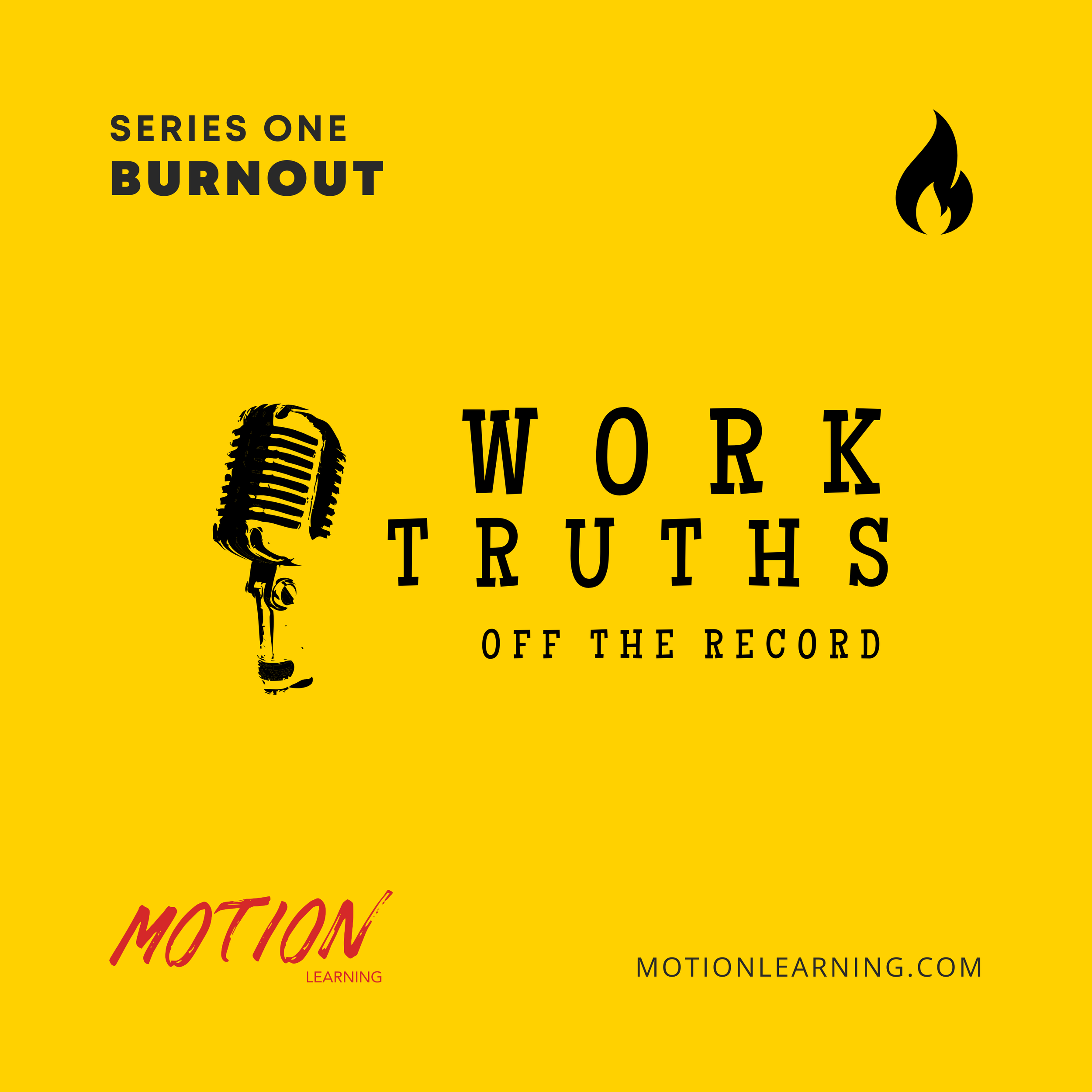Learning from Work Truths: Off the Record - Reflections on Episode 1
Listening to the debut episode of "Work Truths: Off the Record" hosted by my colleague Rachel, with Catherine Lightfoot as her guest, has shifted my thinking and deepened my understanding of what workplace burnout truly looks and feels like.
This episode wasn’t just another abstract talk on the dangers of stress at work—it was a movingly honest journey into the lived realities of burnout, especially from the standpoint of someone who has navigated it as both a senior leader and a human being.
The Slow Disappearing of Self
Catherine’s story, which I’m so grateful she shared, traces a gradual erosion of vitality - a slow fading of self, long before a dramatic collapse. I was struck by her description of losing connection with her own body, energy, and values, operating on autopilot and executing routines without presence or joy. Burnout, she explained, isn’t a single event; it’s extended misalignment and growing numbness that creeps in while the outside world continues operating as usual.
It struck a chord, and echoed other experiences I’ve heard about through conversations, and also provided a cautionary note, because it made me reconsider what warning signs I might be missing in myself and my colleagues. That subtle drift from purpose or pleasure isn’t just a passing phase - it can be the first chapter of a much longer, more challenging story.
Masking and the Hidden Costs
What really stood out to me was Catherine’s insight as a neurodivergent professional, living with ADHD and other differences. She spoke about decades spent "masking" - working hard to appear in control and seamless, even when the inner reality was anything but. This habit can make it much harder to recognise the onset of burnout, and equally challenging for others to spot it.
During periods of major change at work Catherine described her feelings getting masked further - defensiveness, hypervigilance, and an overreaction to routine change all surfaced. But the core of the struggle, she explained, is that masking tells us “we’re fine” even when our bodies know we’re in trouble. I found myself reflecting on how easily leaders, HR professionals, and colleagues can miss these masked signals - outward productivity can hide deep internal distress.
Warning Signs: Dysregulation Is Sneaky
Catherine’s caution makes complete sense: not every red flag is dramatic. Functional people can keep working - commuting, talking, emailing - without ever naming or noticing what they actually feel. Fight and flight responses are well-known, but she described how “freeze” and “fawn” can look deceptively like resilience while they’re actually signs of a hijacked nervous system. Loss of sleep, jaw clenching, lack of joy, and a growing sense that values are no longer aligned - these are the physical and emotional signals we need to notice both in ourselves and in those around us.
One practical tip I learned: regularly - and honestly - asking “How am I feeling?” and “What do I need?” can be a vital early-warning self-check, even if the answers aren’t clear or comforting.
Micro-Practices That Support Recovery
Big lifestyle changes and grand gestures rarely help when someone’s truly exhausted, so I appreciated Catherine’s practical, small-scale strategies for reconnecting. She swears by simple prompts used morning and evening (three minutes each) and keeping a five-year journal with just a couple of sentences per day. These micro-practices helped her track the reality of each day, "anchoring" her progress and struggles in language, which is especially useful when exhaustion makes words hard to find.
The use of tools like an emotions wheel or leaving a physical check-in prompt by the coffee maker are little nudges that can reduce the friction of reflection and make it likelier that someone will actually pause and notice their own state, even on tough days.
For leaders and HR partners, Catherine encourages us to normalise these micro-reflections during team rituals - no sharing required, but offering different formats to suit different personalities, from writing to voice notes or sketches. Embedding these practices in our culture, say, by blocking ten minutes after recurring meetings or providing prompts in different formats, is far more effective than relying on reminders.
The Safety of Sharing
One of the most powerful lessons came from Catherine’s discussion of “sharing.” Burnout is hard to deal with alone, but reaching out feels risky when energy and confidence are depleted. This is not about a public confession but about finding one safe person to be honest with - sooner than feels comfortable. Trust and power dynamics matter: the supportive response of one listener can shape whether someone feels able to open up again.
As colleagues, there’s a responsibility to respond with care, avoiding platitudes and focusing on the real needs behind disclosure. Small changes in language, like offering choices (“Would you like time, a resource, or just someone to listen?”), help lower the emotional cost of seeking help. If you’re supporting, remember, consistent follow-up and respecting boundaries (like preferred modes of contact and rules for engagement) keep the door open and safe.
Stopping Is the Hardest Move
Catherine’s experience showed how difficult stopping can be for high performers, whose identities and sense of responsibility are tied to constant activity. Even after a medical sign-off, she found herself clutching on to connectivity with her team, collapsing after calls, bargaining with her own body about when she’d "feel sick enough to stop."
This part of the episode underlined for me how important it is to recognise that recovery is not linear, and that validation from professionals (GPs, HR) is sometimes the only way to halt damaging habits. It can take weeks before the body "unwinds" from chronic stress; organisations should plan for this lag and avoid judging recovery by responsiveness in its early stages. Responsiveness can actually be a red flag, not a positive sign.
Organisational Policies: The Human Override
What organisations do - and don’t do - matters at every stage.
Catherine argued that the right policy isn’t just written, but a living promise that burnout-related leave is valid, support will be humane and visible, and the return is carefully designed, not left to chance. Leaders and HR must make these policies easy to find and navigate, and ensure that process is predictable, caring, and protected from bureaucratic missteps.
I was especially struck by the idea of the "human override" - the possible, and very desirable, moment when someone in HR cancels a templated, impersonal letter because real care and attention demands discretion. It would be so good if it happens more often.
The Recovery Blueprint: Self, Share, Support
The final lesson I learned from this episode is Catherine’s three-word blueprint: “Self. Share. Support.” At every stage, these anchors guide sustainable recovery for individuals and for organisations:
Self - Daily check-ins, small pauses scheduled into the day, emotional regulation through breath, movement, or quick journaling; tools to make reflection easier, not harder.
Share - Relying on one trusted person, defining expectations for support, and being clear about boundaries and preferences; for managers, respecting roles and recruiting the right support when needed.
Support - Therapy or counselling for individuals in crisis, coaching when the time is right; for employers, visible policies, reliable processes, and an organisational culture that protects and empowers those struggling with burnout.
This episode has left me with more than just facts - it’s given me practical ways to look after myself and be a safer, better colleague for others. Rachel’s calm, insightful hosting helped surface the nuanced, human realities of burnout, and Catherine’s honesty and vulnerability provided a powerful model for change. I’m grateful for the insights and urge anyone working in leadership, HR, or alongside others to listen closely.
Workplace wellbeing begins with truth - the kind of truth Catherine and Rachel shared in this episode - and with simple acts that make self-care, sharing, and support part of our every day.
If you want to subscribe and listen to this and other episodes, you’ll find Work Truths: Off the Record wherever you listen to podcasts, or here:






